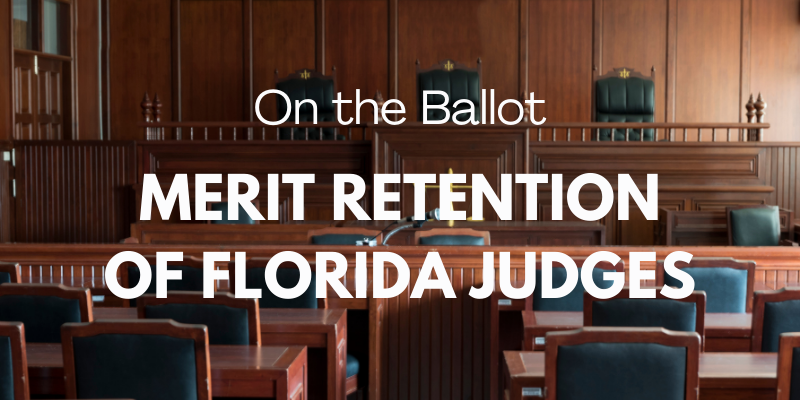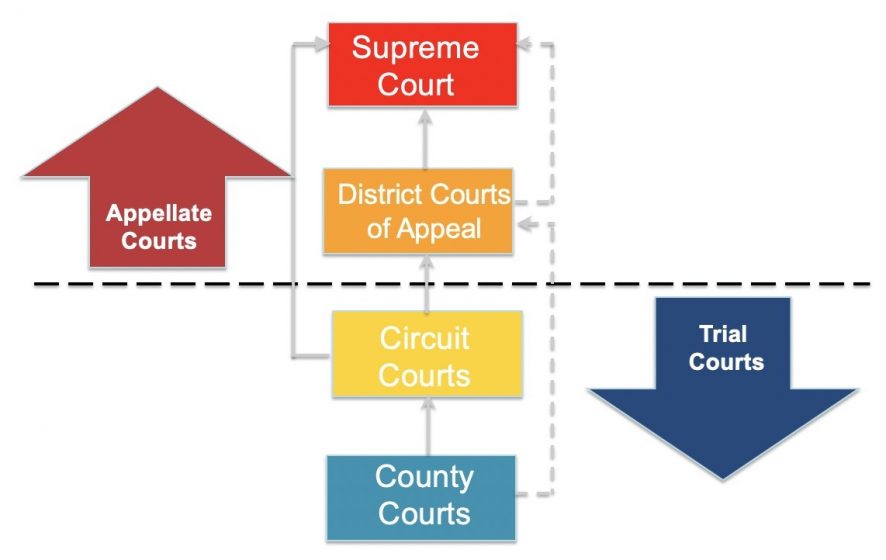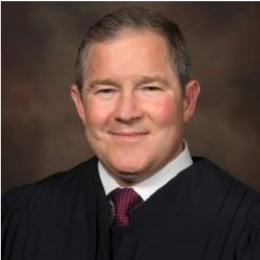
This year, Florida voters will decide if a state Supreme Court justice and 23 state appeals court judges will be retained to serve another term in office.
Specifically, all Florida voters will decide on the retention of Florida Supreme Court Justice Carlos G. Muñiz, and voters in the 14 counties (including Collier) in Florida’s 2nd Appellate District will decide on the retention of Judges Drew Atkinson, Morris Silberman, Daniel H. Sleet, and Andrea Teves Smith. Voters in Florida’s 1st, 3rd, 4th and 5th Appellate Districts will have merit retention decisions about the judges in their districts on the ballot, as well.
Supreme Court justices and judges do not affiliate with a political party. They serve terms of office of six years with a mandatory retirement age of 75, and there are no term limits.
In this post, I’ll explain what a merit retention vote is, provide some information about the justice and judges on our ballots, and provide links to sources where you can learn more.
Structure of Florida’s Courts
The judicial branch of Florida government includes a Supreme Court, District Courts of Appeal, Circuit Courts, and County Courts. The top two tiers of the court system are appellate courts; the lower two tiers are trial courts.

Supreme Court justices and District Courts of Appeal judges are appointed by the governor from lists submitted by Judicial Nominating Commissions, which screen candidates and make recommendations based on their merits.
Upon taking the bench, they serve until the next general election that occurs more than one year after their appointment.
At that point, they come before the voters in a merit retention election in which voters decide whether or not to retain them to serve a six-year term. Thereafter all justices and appeals court judges face merit retention election every six years. Terms are staggered so that not all face the voters in the same election.
If a majority of voters choose not to retain a judge, a vacancy would be created which would be filled through the merit selection process.
For more on Florida’s Supreme Court justices, see:
For more on the judges of Florida’s Second District Court of Appeal, see:
How Can Voters Make Informed Decisions?
Every two years, the Florida Bar’s Constitutional Judiciary Committee oversees a statewide poll that asks in-state Florida Bar members to rate judges and justices who are up for retention votes of whom they have direct knowledge.
Poll results reflect the opinion of Bar members concerning each judge’s qualifications. This is the source I rely upon most heavily to make my voting decisions. See:
- Florida Bar Merit Retention Poll Results – 2020
- Florida Bar Merit Retention Poll Results – 1978 – 2018
In addition to reviewing the poll results and any published biographies, I also do a Google search to see if anything relevant comes up.
Supreme Court Justice Carlos G. Muñiz
Justice Muñiz was appointed by Republican Gov. Ron DeSantis in January 2019. This is his first merit retention vote.

DeSantis named “a nearly 18-year veteran of state Government rather than a judge to the state’s highest court,” wrote Mike Vasilinda of the Capital News Service. Prior to this appointment, Muñiz had most recently been appointed by President Donald Trump to serve as General Counsel of the U.S. Department of Education under Secretary Betsy DeVos.
- Florida appoints Carlos Muñiz, who has never been a judge, to the state’s Supreme Court, Capital News Service via WEARTV.com, 1/22/19
- DeSantis announces Trump administration official Carlos Muñiz as 3rd pick for Florida Supreme Court, Gatehouse Capital Bureau via Florida Times Union, 1/22/19
In the Florida Bar poll, he received a retain vote from 71 percent of total respondents and 63 percent of respondents who say they “have considerable knowledge” of him.
Judge J. Andrew “Drew” Atkinson

Judge Atkinson was appointed by Republican Gov. Rick Scott in 2018. This is his first merit retention vote.
In the Florida Bar poll, he received a retain vote from 76 percent of total respondents, and 69 percent of respondents who say they “have considerable knowledge” of him.
A Google search turned up several articles about cases decided by Judge Atkinson. I am not sharing them here because I am not a lawyer and in no position to second-guess the judge’s ruling. That said, if you are interested, you can search “Judge ‘Drew Atkinson’ Florida” and click on the “News” tab.
Judge Morris Silberman

Judge Silberman was appointed by Republican Gov. Jeb Bush in 2001. He was most recently retained to the Second District Court of Appeal with 71 percent of the vote in 2014. This is his fourth merit retention vote.
In the Florida Bar poll, he received a retain vote from 90 percent of total respondents and 92 percent of respondents who say they “have considerable knowledge” of him. This compares with 94 percent and 95 percent, respectively, in 2014.
Again, a Google search turned up articles about cases decided by Judge Silberman. If you are interested, search “Judge ‘Morris Silberman’ Florida” and click on the “News” tab.
Judge Daniel H. Sleet

Judge Sleet was appointed by Republican Gov. Rick Scott in 2012. He was retained to the Second District Court of Appeal with 72 percent of the vote in 2014. This is his second merit retention vote.
In the Florida Bar poll, he received a retain vote from 85 percent of total respondents and 86 percent of respondents who say they “have considerable knowledge” of him. This compares with 91 percent and 92 percent, respectively, in 2014.
Judge Andrea Teves Smith

Judge Smith was appointed by Republican Gov. Rick Scott in 2019. This is her first merit retention vote.
In the Florida Bar poll, she received a retain vote from 82 percent of total respondents and 80 percent of respondents who say they “have considerable knowledge” of her.
A Google search turned up two profile articles about Judge Smith written before she was appointed to the Appeals Court:
- Polk Circuit Judge Andrea Teves Smith has long pushed for right, just issues. The Ledger, 2/15/15
- Judge with little criminal experience to oversee 2nd-degree murder trial of ex-Lakeland City Commissioner Michael Dunn. The Ledger, 11/16/18
The search also turned up articles about cases decided by Judge Smith. If you are interested, search “Judge ‘Andrea Teves Smith” and click on the “News” tab.
According to a no-longer-available 2016 article in the Palm Beach Post, “No judge has ever been denied another six-year term since the system was implemented in 1976 after three elected justices were investigated and two resigned, when an investigation found they allowed political cronies to influence their decision. Occasionally – most recently in 2012 when tea party activists targeted three high court justices – opposition has surfaced.”
My research did not reveal any that occurred since then.
For more information about Florida’s judicial merit retention process, including a Guide for Florida Voters: Answers to Your Questions about Florida Judges, Judicial Elections and Merit Retention and other voter resources, visit The Vote’s In Your Court.
